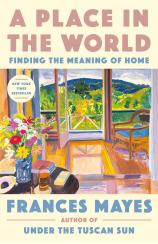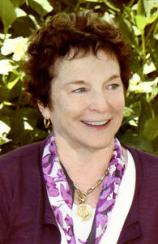A Place in the World: Finding the Meaning of Home
Review
A Place in the World: Finding the Meaning of Home
While reading Frances Mayes’ latest memoir, A PLACE IN THE WORLD, I suddenly realized that my mouth was watering. Although she has often written rapturously about the food experienced in her many dwelling-places, and is known to scatter tempting recipes throughout her prose, it wasn’t one of those passages. It was simply the abundant emotional “taste” of the writing itself that triggered this very primal response.
Having previously read only UNDER THE TUSCAN SUN (and having watched the movie several times), that bestselling book left an indelible impression on all my senses. The delight continued beyond expectation with A PLACE IN THE WORLD, where she gathers up vivid and heartfelt impressions of all the abodes worthy of being called “home” over her long academic and literary career.
Here, Mayes focuses most generously on three dwellings that created powerful influences and anchors in her life and relationships.
"A PLACE IN THE WORLD is certainly a charming and tasteful anthology of particular spaces, but it is so much more."
There’s her childhood house in Georgia, where her mother and extended family taught her by immersion the joys of growing, preparing, cooking and eating good food in a safe, sheltering and affectionate environment. In a part of the country whose culture is still plagued by the traumatic legacy of slavery, racism, sexism and far-right conservatism, “home” becomes much more than a brick-and-mortar retreat from the world’s harsher realities.
Her historic North Carolina house, “Chatwood,” exudes a personality all its own, at times even threatening to overwhelm Mayes and her partner with its constant need for repair and attention. Yet, like a sentient being, the place seems to consciously reward its keepers with grace, solitude, charm and the hard-to-define secret voices that old, much-loved buildings acquire --- not ghosts, but gentle background spirits.
As lovely and compelling as her previous and present American and international homes are, or have been, Mayes spends her delectable prose most lavishly on Bramasole, the ancient once-abandoned villa near Cortona, Italy, that became the real star of her bestselling 1996 memoir, UNDER THE TUSCAN SUN. Restored to almost magical serenity over the years, Bramasole remains one of the two homes where Mayes and her poet-husband, Edward, divide their time each year.
Now at this point in the reader’s shopping-list of comforting virtues that come with long-loved dwellings, it would be easy to say that nothing is all that remarkable about pleasant evocations of places where one likes to live. I could probably spark a brief literary interest in my own home and garden if I put my mind to it. But with A PLACE IN THE WORLD, Mayes soars far beyond mere description and nostalgia.
What binds all her homes together in an irresistible tapestry of color and affection is her honest authenticity about the context, or as the French say, the terroir of each place. So many unique and inviting present-day homes exist on aesthetic and cultural islands, whether rural, urban or suburban. Their charms are known only to those who physically inhabit them --- our global experience of pandemic lockdowns has certainly taught us that with unprecedented immediacy.
But Mayes’ homes thrive in community, and in the case of Bramasole, a community going back over centuries. As a self-described perpetual student (or even pilgrim) of human culture, she seems to instinctively embrace the local ethos of every place where she has lived, even creating a culture of her own where too little of that feeling seemed to reside.
No mere tourist of real estate, she is also a passionate restorer and reviver of that culture, which easily explains why local people in half-a-dozen countries have so quickly accepted her as one of their own.
And when she writes about that attachment to community, it is often expressed in the exchange of food or ingredients, collaboration in local tasks like harvesting olives, the hospitality of guests gathered for no other reason than good fellowship, and the solidarity that comes with engaging and respecting tradespeople who love the place you’re restoring as much as you do. In short, Mayes is more friend than foreigner in her various homes, and her writing is infused with this rare communal quality.
As rooted as she is, or has become, in her various homes, Mayes also gives just as generous attention to what they represent in a more philosophical sense. You can’t know how sweet, safe and serene it feels to be domestically and geographically rooted unless you have experienced the opposite condition, whether moving frequently for work, or in the more dire circumstances of being forcibly uprooted by war, oppression or natural disaster.
Home also offers us a measure of time, the one thing in the universe we cannot control, either in its speed of passage or in the amount of it we will have. As Mayes does so eloquently, we often relate to a good home in terms of how long we have lived in it, and how long it has lived in us, even decades after leaving its physical presence.
A PLACE IN THE WORLD is certainly a charming and tasteful anthology of particular spaces, but it is so much more. We may envy or aspire to a magical villa in Tuscany (who wouldn’t?), but Frances Mayes also reminds us to appreciate our own homes in the here-and-now, however modest or needy they may be, as our special and unique “places in the world.”
Reviewed by Pauline Finch on August 26, 2022
A Place in the World: Finding the Meaning of Home
- Publication Date: August 22, 2023
- Genres: Memoir, Nonfiction
- Paperback: 304 pages
- Publisher: Crown
- ISBN-10: 0593443357
- ISBN-13: 9780593443354




